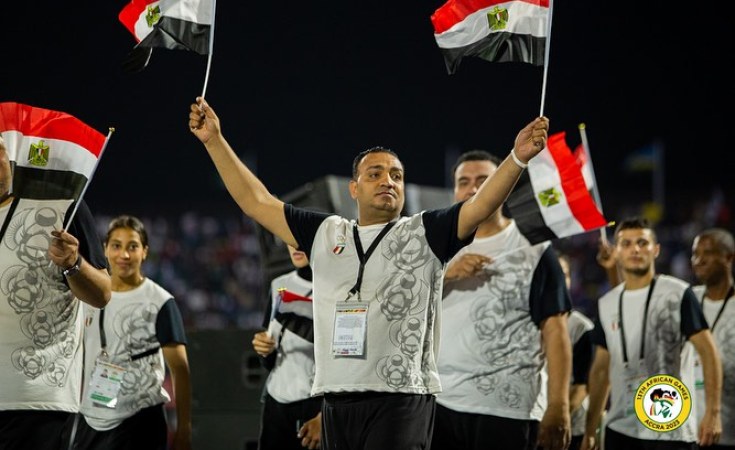The African Games, formerly the All-African Games, is taking place from 8-23 March in Ghana. Scheduled for 2023, they were postponed due to a regional impasse over marketing rights, delays in getting facilities ready and Ghana's growing economic crisis. Kamilla Swart researches and teaches sport mega-events. We asked her about the African Games' potential for sport tourism and about the pros and cons of hosting it.
What is the African Games?
The African Games is a multi-sport event held every four years, generally one year before the Olympic Games. It's positioned as a pan-African tournament and is owned by the African Union (AU). It aims to showcase sporting prowess in Africa, enhance cultural exchanges and promote solidarity, social cohesion and peace within Africa.
The games has a long history. The first edition was successfully held in 1965 in the Republic of Congo, where 30 countries participated in 10 sports - athletics, basketball, football, tennis, weightlifting, cycling, swimming, handball, volleyball and wrestling.
The African Games in Ghana is only the 13th edition because the event has not been held every four years. The second edition took place in Nigeria in 1973 (36 countries, 12 sports with the inclusion of boxing and judo), followed by Algiers in 1978 (38 countries). The fourth edition only took place in 1987 in Kenya (41 countries, 14 sports).
Since then the games were held every four years, with an increasing number of countries and sports. The Ghana edition features 54 countries competing in 30 disciplines. Seven of them are demonstration sports that showcase emerging trends, such as esports (electronic sports) and mixed martial arts.
Other hosts have included Egypt, Zimbabwe, South Africa, Algeria, Mozambique and, most recently, Morocco in 2019.
Who will be watching and attending?
It's anticipated that about 5,000 athletes, 3,000 officials, 2,000 volunteers and 1,000 guests will participate in Ghana.
Large scale events like these generally attract a wide range of spectators, including local residents who want to see top athletes from across Africa compete in their favourite disciplines.
Viewers from around the world are able to watch the competitions and ceremonies. Local and international television networks, radio stations and online streaming platforms are expected to broadcast the games to audiences around the world. This will attract a large contingent of media workers to Ghana.
GTV Sports Plus, Ghana's leading sports channel, is the official broadcaster.
What do studies say about the outcome of hosting the event?
There have been many studies on the triple bottom line (economic, social and environmental) impacts of hosting major sporting events like this. While their findings vary, they suggest that hosting can have both positive and negative effects.
On the positive side, hosting the games can boost tourism, stimulate economic growth, improve infrastructure, and promote national pride and unity. However, there are also potential risks and challenges, including cost overruns, displacement of local communities, environmental concerns, and the long term sustainability of facilities built for the event.
Studies from three African Games - in Morocco, Mozambique and South Africa - serve as examples to offer more detailed insights.
Study 1: Morocco
The findings of a 2020 case study on Morocco's hosting of the 2019 African Games underscore the importance of addressing various challenges to enhance the success and long-term benefits of hosting. These include stakeholder engagement, legacy planning, public attendance and impact assessment. The study suggests that the impact of the games on Morocco may be modest.
The headlines from the study are that it found there was a limited involvement of territorial actors in the organisation process, an absence of feasibility studies, low attendance at venues and a lack of legacy planning.
Study 2: Mozambique
A 2011 study of Mozambique's staging of the All-Africa Games in the same year found that, overall, hosting brought a mix of excitement for new sport facilities and challenges for local vendors. The study highlights the complexities and potential impacts of mega-events on urban areas and marginalised communities.
The main findings were that urban development for the games led to the displacement of many vendors and marketers from their profitable locations. The urban poor were not properly considered in the city's image-making strategies. Despite this, some expressed hopes that the development would improve their lives in the long run. However, the actual outcomes and benefits remain uncertain.
Study 3: South Africa
A 2014 study on South Africa's hosting of the 1999 All-Africa Games focused on infrastructure development in Johannesburg because the legacy of the event was mainly centred on the development of the athletes' village in the township of Alexandra (a black urban area created by the separate development policies of the former apartheid state).
The main findings were that despite significant investment, the village did not lead to substantial improvements in the overall deprivation of Alexandra. The economic and brand-building legacy of the games in Johannesburg was largely forgotten 15 years later.
Will it be worth it for Ghana?
Studies show that the negatives can easily outweigh the positives of hosting the games. But whether hosting will be worth it for Ghana will require a comprehensive analysis of all the necessary data after the fact.
While excitement builds up and the organising committee underscores the country's readiness, concerns have been reported about logistical problems, some issues with facilities and a lack of big name athletes competing. Many in Ghana are also reportedly sceptical about the country paying for a mega-event while it's going through an economic crisis.
Read more: Morocco's fabulous football year - what's behind their success on and off the field
Ultimately a pan-African event has many positives for the continent. If Ghana's showcasing of its rich culture and warm hospitality is coupled with a high standard of organisation and competition then the games will be sure to delight viewers.
A major caution from past studies, though, is that hosting a mega-event like this must be fully integrated with the host country's development strategies.
Kamilla Swart, Associate professor, Hamad Bin Khalifa University


